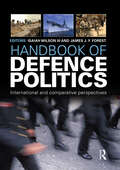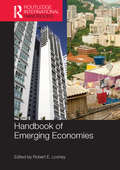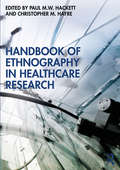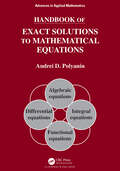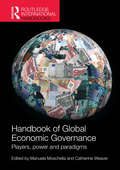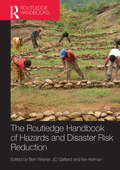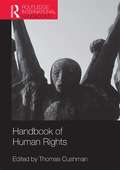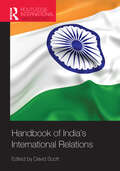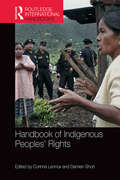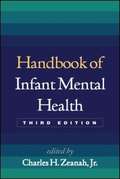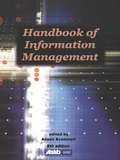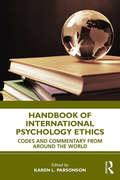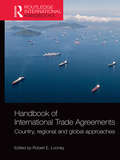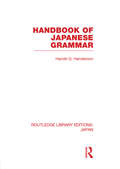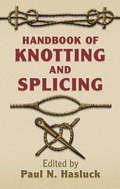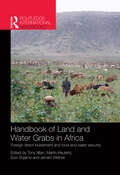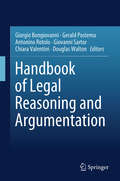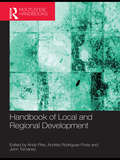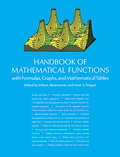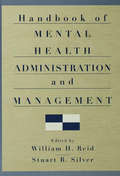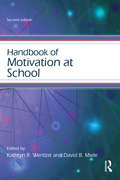- Table View
- List View
Handbook of Defence Politics: International and Comparative Perspectives (Routledge International Handbooks Ser.)
by Isaiah Wilson III James J. F. ForestIssues of defence politics and policy have long been at the forefront of political agendas and defining of international affairs. However, the dramatic changes to the global system that have taken place since the end of the Cold War and parrticularly since the terror attacks on the USA on 11 September 2001 have amplified the world's attention toward political and policy issues of national, regional and global security. The focus of this volume is on examining the fundamental causes of, and defence policy responses to this new 'post-9/11' security environment. Edited by Isaiah (Ike) Wilson III and James J. F. Forest of the US Military Academy, West Point, USA, this volume is international in scope, with pieces written by experts in the field, offering a collection of up-to-date and balanced insights on key contemporary issues of concern to defence policymakers. The book will be an invaluable reference tool for academics and students, researchers in international relations, policymakers, media professionals and government officials.
Handbook of Drugs in Intensive Care
by Henry G W Paw Rob ShulmanA thoroughly updated edition of this well-established guide to drugs and prescribing for intensive care. The book is split into two sections: an A-Z guide to the drugs available, and concise notes on the key topics and situations faced on a daily basis. T
Handbook of Emerging Economies (Routledge International Handbooks Ser.)
by Robert E. LooneyA major new volume in the Routledge International Handbooks series analysing emerging and newly emerged economies, including the BRICS countries (Brazil, Russia, India, China and South Africa) and other likely (Turkey, Indonesia, Mexico, and South Korea) as well as possible (Vietnam, The Philippines, Nigeria, Pakistan, Egypt, Colombia and Argentina) candidates for emerging economy status. Chapters on theories surrounding emerging markets (including the Beijing/Washington Consensus debate) offer an overview of current issues in development economics, in addition to providing an integrated framework for the country case studies. Written by experts, this handbook will be invaluable to academics and students of economics and emerging economies, as well as to business people and researchers seeking information on economic development and the accelerating pace of globalization.
Handbook of Engineering Systems Design
by Pieter E. Vermaas Anja Maier Josef OehmenThis handbook charts the new engineering paradigm of engineering systems. It brings together contributions from leading thinkers in the field and discusses the design, management and enabling policy of engineering systems. It contains explorations of core themes including technical and (socio-) organisational complexity, human behaviour and uncertainty. The text includes chapters on the education of future engineers, the way in which interventions can be designed, and presents a look to the future. This book follows the emergence of engineering systems, a new engineering paradigm that will help solve truly global challenges. This global approach is characterised by complex sociotechnical systems that are now co-dependent and highly integrated both functionally and technically as well as by a realisation that we all share the same: climate, natural resources, a highly integrated economical system and a responsibility for global sustainability goals. The new paradigm and approach requires the (re)designing of engineering systems that take into account the shifting dynamics of human behaviour, the influence of global stakeholders, and the need for system integration. The text is a reference point for scholars, engineers and policy leaders who are interested in broadening their current perspective on engineering systems design and in devising interventions to help shape societal futures.
Handbook of Ethnography in Healthcare Research
by Hackett, Paul M.W.This handbook provides an up-to-date reference point for ethnography in healthcare research. Taking a multi-disciplinary approach, the chapters offer a holistic view of ethnography within medical contexts. This edited volume is organized around major methodological themes, such as ethics, interviews, narrative analysis and mixed methods. Through the use of case studies, it illustrates how methodological considerations for ethnographic healthcare research are distinct from those in other fields. It has detailed content on the methodological facets of undertaking ethnography for prospective researchers to help them to conduct research in both an ethical and safe manner. It also highlights important issues such as the role of the researcher as the key research instrument, exploring how one’s social behaviours enable the researcher to ‘get closer’ to his/her participants and thus uncover original phenomena. Furthermore, it invites critical discussion of applied methodological strategies within the global academic community by pushing forward the use of ethnography to enhance the body of knowledge in the field. The book offers an original guide for advanced students, prospective ethnographers, and healthcare professionals aiming to utilize this methodological approach.
Handbook of Exact Solutions to Mathematical Equations (ISSN)
by Andrei D. PolyaninThis reference book describes the exact solutions of the following types of mathematical equations:● Algebraic and Transcendental Equations ● Ordinary Differential Equations ● Systems of Ordinary Differential Equations ● First-Order Partial Differential Equations ● Linear Equations and Problems of Mathematical Physics ● Nonlinear Equations of Mathematical Physics ● Systems of Partial Differential Equations ● Integral Equations ● Difference and Functional Equations ● Ordinary Functional Differential Equations ● Partial Functional Differential EquationsThe book delves into equations that find practical applications in a wide array of natural and engineering sciences, including the theory of heat and mass transfer, wave theory, hydrodynamics, gas dynamics, combustion theory, elasticity theory, general mechanics, theoretical physics, nonlinear optics, biology, chemical engineering sciences, ecology, and more. Most of these equations are of a reasonably general form and dependent on free parameters or arbitrary functions.The Handbook of Exact Solutions to Mathematical Equations generally has no analogs in world literature and contains a vast amount of new material. The exact solutions given in the book, being rigorous mathematical standards, can be used as test problems to assess the accuracy and verify the adequacy of various numerical and approximate analytical methods for solving mathematical equations, as well as to check and compare the effectiveness of exact analytical methods.
Handbook of Global Economic Governance (Routledge International Handbooks Ser.)
by Catherine Weaver Manuela MoschellaSince the summer of 2007, the world scenario has been dominated by the US sub-prime mortgage crisis and its repercussions on global financial markets and economic growth. As banks around the world wrote down their losses and governments intervened to rescue domestic financial institutions, financial distress severely hit the real economy leading to what has been widely defined as the worst recession since the 1930s. Under these conditions, along with the immediate concern for stemming the effects of the crisis, policy-makers around the world have been debating the long-term measures that have to be adopted in order to reduce the likelihood of future crises and to ensure stable economic growth. Although this debate has not yet produced significant transformations, it indicates a renewed concern about the institutional architecture that is meant to govern the global economic and financial system. This book tackles the issue of what the governance of the global economic and financial system looks like and what the prospects for its reform are. Specifically, the book will address the following three main themes: Governance: What is governance in the international economic system? What forms does it take? How did it come about? How can we study it?; Functions of governance: What are the functions of global economic governance? Who performs them? What are the rules and mechanisms that make global governance possible? Problems and prospects of governance: What are the problems in global economic governance? Is there a trade-off between legitimacy and efficiency? What are the prospects for reform of global economic governance in the aftermath of the global financial crisis? This book will: _ Provide a thorough analysis of the issues at stake in designing international rules and institutions able to govern the global economy; _ Illustrate and analyze virtually all the main institutions, rules, and arrangements that make up global economic governance, inscribing them within the function these institutions, rules, and arrangements are meant to perform; _ Discuss the problems that affect today’s global economic governance and assess alternative proposals to reform the international financial architecture.
Handbook of Happiness Research in Latin America
by Mariano RojasThis book presents original happiness research from and about a region that shows unexpectedly high levels of happiness. Even when Latin American countries cannot be classified as high-income countries their population do enjoy, on average, high happiness levels. The book draws attention to some important factors that contribute to the happiness of people, such as: relational values, human relations, solidarity networks, the role of the family, and the availability and gratifying using of leisure time. In a world where happiness is acquiring greater relevance as a final social and personal aim both the academic community and the social-actors and policy-makers community would benefit from Happiness Research in Latin America.
Handbook of Hazards and Disaster Risk Reduction
by Jc Gaillard Ilan Kelman Ben WisnerThe Handbook provides a comprehensive statement and reference point for hazard and disaster research, policy making, and practice in an international and multi-disciplinary context. It offers critical reviews and appraisals of current state of the art and future development of conceptual, theoretical and practical approaches as well as empirical knowledge and available tools. Organized into five inter-related sections, this Handbook contains sixty-five contributions from leading scholars. Section one situates hazards and disasters in their broad political, cultural, economic, and environmental context. Section two contains treatments of potentially damaging natural events/phenomena organized by major earth system. Section three critically reviews progress in responding to disasters including warning, relief and recovery. Section four addresses mitigation of potential loss and prevention of disasters under two sub-headings: governance, advocacy and self-help, and communication and participation. Section five ends with a concluding chapter by the editors. The engaging international contributions reflect upon the politics and policy of how we think about and practice applied hazard research and disaster risk reduction. This Handbook provides a wealth of interdisciplinary information and will appeal to students and practitioners interested in Geography, Environment Studies and Development Studies.
Handbook of Human Rights (Routledge International Handbooks)
by Thomas CushmanIn mapping out the field of human rights for those studying and researching within both humanities and social science disciplines, the Handbook of Human Rights not only provides a solid foundation for the reader who wants to learn the basic parameters of the field, but also promotes new thinking and frameworks for the study of human rights in the twenty-first century. The Handbook comprises over sixty individual contributions from key figures around the world, which are grouped according to eight key areas of discussion: foundations and critiques; new frameworks for understanding human rights; world religious traditions and human rights; social, economic, group, and collective rights; critical perspectives on human rights organizations, institutions, and practices; law and human rights; narrative and aesthetic dimension of rights; geographies of rights. In its presentation and analysis of the traditional core history and topics, critical perspectives, human rights culture, and current practice, this Handbook proves a valuable resource for all students and researchers with an interest in human rights.
Handbook of Inclusive Education
by Central Board Of Secondary EducationThe Constitution of India emphasizes the importance of equality of status and opportunity for all citizens, and institutions like CBSE have a duty to support and inspire every child to succeed. In order to promote inclusivity in schools and ensure that children with special needs are accommodated, CBSE has made it mandatory for schools to provide disability-specific learning aids, alternate pedagogies, and exam concessions. To disseminate accurate information on these provisions, CBSE has created a handbook for teachers that provides guidance on identifying children with special needs, creating a barrier-free environment, using instructional designs and assistive technologies, and conducting assessments. While the handbook follows a generic approach, it can be adapted to suit the needs of different contexts and target groups. CBSE believes that the tools and techniques outlined in the handbook will be useful for teachers and will increase access, equity, and participation of all children in the learning process.
Handbook of India's International Relations
by David ScottThis Handbook gives an overview of India’s international relations, given the development of India as a major economic power in the world, and the growing interest in the impact of Asia on the international system in the future. Edited by David Scott of Brunel University, and with chapters written by a variety of experts, the Handbook of India’s International Relations offers an up-to-date, unbiased and comprehensive resource to academics, students of international relations, business people, media professionals and the general reader.There is a pre-publication price on this title, the price rises to £150 three months after publication.
Handbook of Indigenous Peoples' Rights (Routledge International Handbooks Ser.)
by Corinne Lennox Damien ShortThis handbook will be a comprehensive interdisciplinary overview of indigenous peoples’ rights. Chapters by experts in the field will examine legal, philosophical, sociological and political issues, addressing a wide range of themes at the heart of debates on the rights of indigenous peoples. The book will address not only the major questions, such as ‘who are indigenous peoples? What is distinctive about their rights? How are their rights constructed and protected? What is the relationship between national indigenous rights regimes and international norms? but also themes such as culture, identity, genocide, globalization and development, rights institutionalization and the environment.
Handbook of Infant Mental Health
by Charles H. ZeanahWidely regarded as the standard reference in the field, this state-of-the-art Handbook offers a comprehensive analysis of developmental, clinical, and social aspects of mental health from birth to the preschool years. Leading authorities explore models of development; biological, family, and sociocultural risk and protective factors; and frequently encountered disorders and disabilities. Evidence-based approaches to assessment and treatment are presented, with an emphasis on ways to support strong parent-child relationships. The volume reviews the well-documented benefits of early intervention and prevention and describes applications in mental health, primary care, childcare, and child welfare settings. The chapter on psychopharmacology has been updated for the paperback edition.
Handbook of Information Management
by Alison ScammellThis is effectively the eighth edition of Aslib's flagship reference work, Handbook of Special Librarianship and Information Work, which has provided the seminal text on modern information theory, practice, and procedure since 1957. Scammell draws on a substantial background of research and best practice to provide a pragmatic approach to information management in the workplace. This volume covers strategic, legal, management, and marketing issues and highlights the importance of new web-based delivery mechanisms. It includes contributions from outside the UK, mirroring the global nature of information management.Includes:* essential reference to core theories and principles of information organization, retrieval and dissemination* a new chapter exploring the legal issues involved with information on the Internet* new topics including: freedom of information, project management, digital library research, the hybrid library, the effective website and the intranet.
Handbook of International Psychology Ethics: Codes and Commentary from Around the World
by Karen L. ParsonsonThe Handbook of International Psychology Ethics discusses the most central, guiding principles of practice for mental health professionals around the world. For researchers, practicing mental health professionals, and students alike, the book provides a window into the values and belief systems of cultures worldwide. Chapters cover ethics codes from psychological associations and societies on five continents, translating each code into English and discussing vital questions around how the code is put into practice, what it means to association members and society at large, as well as how the code was developed within its unique historical, political, and cultural context.
Handbook of International Trade Agreements: Country, regional and global approaches (Routledge International Handbooks)
by Robert E. LooneyInternational trade has, for decades, been central to economic growth and improved standards of living for nations and regions worldwide. For most of the advanced countries, trade has raised standards of living, while for most emerging economies, growth did not begin until their integration into the global economy. The economic explanation is simple: international trade facilitates specialization, increased efficiency and improved productivity to an extent impossible in closed economies. However, recent years have seen a significant slowdown in global trade, and the global system has increasingly come under attack from politicians on the right and on the left. The benefits of open markets, the continuation of international co-operation, and the usefulness of multilateral institutions such as the World Trade Organization (WTO), the International Monetary Fund and the World Bank have all been called into question. While globalization has had a broadly positive effect on overall global welfare, it has also been perceived by the public as damaging communities and social classes in the industrialized world, spawning, for example, Brexit and the US exit from the Trans-Pacific Partnership. The purpose of this volume is to examine international and regional preferential trade agreements (PTAs), which offer like-minded countries a possible means to continue receiving the benefits of economic liberalization and expanded trade. What are the strengths and weaknesses of such agreements, and how can they sustain growth and prosperity for their members in an ever-challenging global economic environment? The Handbook is divided into two parts. The first, Global Themes, offers analysis of issues including the WTO, trade agreements and economic development, intellectual property rights, security and environmental issues, and PTAs and developing countries. The second part examines regional and country-specific agreements and issues, including NAFTA, CARICOM, CETA, the Pacific Alliance, the European Union, EFTA, ECOWAS, SADC, TTIP, RCEP and the TPP (now the CPTPP), as well as the policies of countries such as Japan and Australia.
Handbook of Japanese Grammar (Routledge Library Editions: Japan)
by Harold G HendersonThis grammar has been written to help the student to think in the Japanese way. Part One contains several introductory notes on Nomenclature, Syntax, Verbs, Aru, Iru, Oru, on Adjectives and on Foreign Words. Part Two concentrates on connectives – the particles and suffixes which modify the sense of other words or show the relationship of these words to each other. These connectives, the heart of Japanese grammar, present unusual difficulty to foreign students. Arranged alphabetically in dictionary form, each word is followed by a textual explanation of how it is used and of its various meanings, with cautions as to its translation. The forms covered include not only those of the "standard" colloquial literary or bungo styles, but also the more common colloquialisms and provincial forms, whether or not these are strictly grammatical. No other text available makes as through or as complete a classification.
Handbook of Knotting and Splicing (Dover Maritime Series)
by Paul N. HasluckGenerations of scouts and sailors have learned their lore from this classic reference by a master craftsman. Editor Paul N. Hasluck was a renowned contributor to numerous technical journals as well as the author of several books on crafts and antiques. His clearly written guide--amply illustrated with 208 figures--dates from the turn of the twentieth century and offers timeless instruction for knotters and splicers of ropes.Starting with simple and useful knots, this manual proceeds to more complex varieties: eye knots, hitches, and bends; ring knots and rope shortenings; ties and lashings; and fancy knots. Additional topics include rope splicing; working cordage; hammock making; lashings and ties for scaffolding; and splicing and socketing wire ropes. A helpful index appears at the end, and a list of illustrations identifies the figures in order of appearance.
Handbook of Land and Water Grabs in Africa: Foreign direct investment and food and water security (Routledge International Handbooks Ser.)
by Tony Allan Jeroen Warner Martin Keulertz Suvi SojamoAccording to estimates by the International Land Coalition based at the International Fund for Agricultural Development (IFAD), 57 million hectares of land have been leased to foreign investors since 2007. Current research has focused on human rights issues related to inward investment in land but has been ignorant of water resource issues and the challenges of managing scarce water. This handbook will be the first to address inward investment in land and its impact on water resources in Africa. The geographical scope of this book will be the African continent, where land has attracted the attention of risk-taking investors because much land is under-utilised marginalized land, with associated water resources and rapidly growing domestic food markets. The successful implementation of investment strategies in African agriculture could determine the future of more than one billion people. An important factor to note is that Sub-Saharan Africa will, of all the continents, be hit hardest by climate change, population growth and food insecurity. Sensible investment in agriculture is therefore needed, however, at what costs and at whose expense? The book will also address the livelihoods theme and provide a holistic analysis of land and water grabbing in Sub-Saharan Africa. Four other themes will addressed: politics, economics, environment and the history of land investments in Sub-Saharan Africa. The editors have involved a highly diverse group of around 25 expert researchers, who will review the pro and anti-investment arguments, geopolitics, the role of capitalist investors, the environmental contexts and the political implications of, and reasons for, leasing millions of hectares in Sub-Saharan Africa. To date, there has been no attempt to review land investments through a suite of different lenses, thus this handbook will differ significantly from existing research and publication. The editors are Tony Allan, (Professor Emeritus, Department of Geography, School of Oriental and African Studies and King’s College London); Jeroen Warner (Assistant Professor, Disaster Studies, University of Wageningen); Suvi Sojamo (PhD Researcher, Water and Development Research Group, Aalto University); and Martin Keulertz (PhD Researcher, Department of Geography, London Water Group, King’s College London).
Handbook of Legal Reasoning and Argumentation
by Douglas Walton Giovanni Sartor Antonino Rotolo Giorgio Bongiovanni Gerald Postema Chiara ValentiniThis handbook addresses legal reasoning and argumentation from a logical, philosophical and legal perspective. The main forms of legal reasoning and argumentation are covered in an exhaustive and critical fashion, and are analysed in connection with more general types (and problems) of reasoning. Accordingly, the subject matter of the handbook divides in three parts. The first one introduces and discusses the basic concepts of practical reasoning. The second one discusses the general structures and procedures of reasoning and argumentation that are relevant to legal discourse. The third one looks at their instantiations and developments of these aspects of argumentation as they are put to work in the law, in different areas and applications of legal reasoning.
Handbook of Local and Regional Development
by Andy PikeThe Handbook of Local and Regional Development provides a comprehensive statement and reference point for local and regional development. The scope of this Handbook’s coverage and contributions engages with and reflects upon the politics and policy of how we think about and practise local and regional development, encouraging dialogue across the disciplinary barriers between notions of ‘local and regional development’ in the Global North and ‘development studies’ in the Global South. This Handbook is organized into seven inter-related sections, with an introductory chapter setting out the rationale, aims and structure of the Handbook. Section one situates local and regional development in its global context. Section two establishes the key issues in understanding the principles and values that help us define what is meant by local and regional development. Section three critically reviews the current diversity and variety of conceptual and theoretical approaches to local and regional development. Section four address questions of government and governance. Section five connects critically with the array of contemporary approaches to local and regional development policy. Section six is an explicitly global review of perspectives on local and regional development from Africa, Asia-Pacific, Europe, Latin America and North America. Section seven provides reflection and discussion of the futures for local and regional development in an international and multidisciplinary context. With over forty contributions from leading international scholars in the field, this Handbook provides critical reviews and appraisals of current state-of-the-art conceptual and theoretical approaches and future developments in local and regional development.
Handbook of Mathematical Functions: with Formulas, Graphs, and Mathematical Tables
by Milton Abramowitz Irene A. StegunDespite the increasing use of computers, the basic need for mathematical tables continues. Tables serve a vital role in preliminary surveys of problems before programming for machine operation, and they are indispensable to thousands of engineers and scientists without access to machines. Because of automatic computers, however, and because of recent scientific advances, a greater variety of functions and a higher accuracy of tabulation than have been available until now are required.In 1954, a conference on mathematical tables, sponsored by M.I.T. and the National Science Foundation, met to discuss a modernization and extension of Jahnke and Emde's classical tables of functions. This volume, published 10 years later by the U.S. Department of Commerce, is the result. Designed to include a maximum of information and to meet the needs of scientists in all fields, it is a monumental piece of work, a comprehensive and self-contained summary of the mathematical functions that arise in physical and engineering problems.The book contains 29 sets of tables, some to as high as 20 places: mathematical constants; physical constants and conversion factors (6 tables); exponential integral and related functions (7); error function and Fresnel integrals (12); Bessel functions of integer (12) and fractional (13) order; integrals of Bessel functions (2); Struve and related functions (2); confluent hypergeometric functions (2); Coulomb wave functions (2); hypergeometric functions; Jacobian elliptic and theta functions (2); elliptic integrals {9); Weierstrass elliptic and related functions; parabolic cylinder functions {3); Mathieu functions (2); spheroidal wave functions (5); orthogonal polynomials (13); combinatorial analysis (9); numerical interpolation, differentiation and integration (11); probability functions (ll); scales of notation (6); miscellaneous functions (9); Laplace transforms (2); and others.Each of these sections is prefaced by a list of related formulas and graphs: differential equations, series expansions, special functions, and other basic relations. These constitute an unusually valuable reference work in themselves. The prefatory material also includes an explanation of the numerical methods involved in using the tables that follow and a bibliography. Numerical examples illustrate the use of each table and explain the computation of function values which lie outside its range, while the editors' introduction describes higher-order interpolation procedures. Well over100 figures illustrate the text.In all, this is one of the most ambitious and useful books of its type ever published, an essential aid in all scientific and engineering research, problem solving, experimentation and field work. This low-cost edition contains every page of the original government publication.
Handbook of Mental Health Administration and Management
by Mph William H. Reid Stuart B. SilverClinicians who understand mental health care administration in addition to their clinical fields are likely to be valuable to the organizations in which they work. This handbook is an accessible source of information for professionals coming from either clinical or management backgrounds. Sections offer coverage in: mental health administrative principles, mental health care management, business, finance and funding of care, information technology, human resources and legal issues.
Handbook of Motivation at School (Educational Psychology Handbook)
by Edited by Kathryn R. Wentzel and David B. MieleThe second edition of the Handbook of Motivation at School presents an integrated compilation of theory and research in the field. With chapters by leading experts, this book covers the major theoretical perspectives in the field as well as their application to instruction, learning, and social adjustment at school. Section I focuses on theoretical perspectives and major constructs, Section II on contextual and social influences on motivation, and Section III on new directions in the field. This new edition will have the same popular organizational structure with theories at the beginning. It will also include new chapters that cover motivation as it relates to identity, culture, test anxiety, mindfulness, neuroscience, parenting, metacognition, and regulatory focus.
